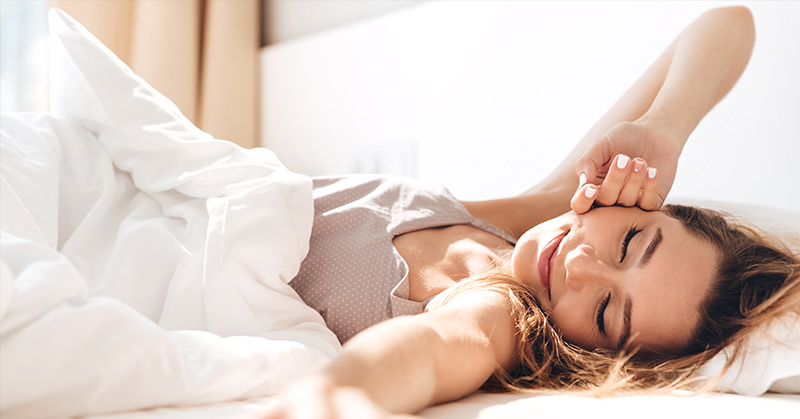According to science, the secret to looking good and feeling good is not a product found in a health food store or makeup boutique. It’s something everyone already has access to, a tool that people often neglect and dismiss: sleep. That’s right. Beauty sleep has been proven to be a legitimate thing.
The Sleep Survey
A team of sleep experts from Sealy UK, a mattress brand, conducted a survey that asked over 1,000 people about their sleep habits and physical appearance. According to 60% of the participants, more sleep equated positive change in their appearance. The longer and better they slept, the more they’d wake up with clear skin, bright eyes, a natural glow, and feeling good. People also tended to rate looking well-rested as more important than fashion, exercise, makeup, and grooming when it comes to attractiveness.
The survey found that those who slept nine hours and ten minutes every night were most likely to have the most beautifying effects from sleep, especially for those who slept from 9:45 p.m. and got up at 6:55 a.m.
For those who blanch at the idea of over nine hours of sleep every night — between work, family, hobbies, and other obligations, who has time for that? — don’t worry. Getting a decent amount of high-quality sleep will do the trick, depending on how much your body needs.
Sealy UK’s sleep expert Neil Robinson explains, “Many of us strive to look and feel good and spend a large amount of money trying to do so. However, we seem to forget that achieving a better night’s sleep can positively impact our overall appearance, without having to break the bank.
“With this in mind, it’s important to consider the quality of sleep you are getting and doing everything possible to create an environment which makes quality sleep more likely.“
“This could include investing in a comfortable and supportive bed, creating a calm and quiet sleeping environment, or implementing a regular pre-sleep routine.” [1]
How Sleep Affects Skin
Research has found that one night of poor sleep can result in:
- Swollen eyes
- Darker undereye circles
- Paler skin
- More wrinkles
- Droopier corners of the mouth
- Hanging eyelids [2]
A study from 2017 found that two days of sleep deprivation negatively affected their volunteers’ perceived attractiveness, health, and trustworthiness. [3]
Sleep is when the body relaxes and repairs itself. As a person slumbers, his blood flow increases, and his skin rebuilds its collagen and repairs any damage from the day like UV exposure, as well as reducing wrinkles and age spots.
Here are five ways you can improve your skin overnight:
1.Get a Full Night’s Sleep
The recommended hours of sleep are seven to nine per night. Sleep deprivation can cause unwanted symptoms like skin that ages more quickly, skin that doesn’t recover well from environmental stressors, and an overall decrease in skin quality.
2. Wash Your Face Before Bed
It’s more important to wash your face at night than in the morning. You don’t need a fancy product, a gentle cleanser will do the trick, as long as it removes dirt, excess oil, and makeup. Going to sleep with these particles on your face can cause dry skin, rashes, infections, inflammation, large pores, and acne.
3. Moisturize
Cleaning the face can cause dryness, especially if you then retire in a low-humidity bedroom. There’s two parts to this tip: use a topical moisturizer — again, it doesn’t need to be fancy — and drink water. Keep a water bottle on your bedside table to remind you to stay hydrated.
4. Sleep on Your Back
Sleeping takes up one-third of your day, so choose your position wisely. Resting your cheek on a rough cotton pillowcase can irritate the skin and result in wrinkles. See if you can train yourself to sleep on your back, or invest in a new pillowcase. Silk and satin cases reduce skin irritation and compression; copper-oxide cases minimizes crow’s feet and other facial lines.
5. Elevate Your Head
Elevating the head has a host of benefits, including alleviating snoring, acid reflux, and nasal drips. Plus, it can reduce those dark circles under your eyes by preventing the blood from pooling. Simply grab another pillow or prop up the edge of your mattress. [4]
Beauty Sleep is Just the Beginning
As if we needed more convincing, a good night’s sleep comes with many more benefits beyond an improved appearance.
For one, sleep deprivation is associated with increased hunger and weight gain. The American Heart Association found that people eat over 500 additional calories when they are tired. [5] Furthermore, better sleep means better decisions. The Journal of Sleep Research discusses a study where 54 young adults played a gambling-type card game. [6] The well-rested folks made smarter choices and won four times more often than those who were suffering from a lack of sleep. In other words, “sleep on it” is sound advice.
Besides looking better, we’ll feel better, but no one needs science to tell them sleep is important. Yet perhaps these findings will compel us to invest in a good mattress and pillow, or turn off our screens at an earlier hour instead of scrolling until our eyes throb. Which, of course, none of us has ever done…
- Sealy UK. Is There Such a Thin As Beauty Sleep. https://www.sealy.co.uk/deeper-sleep/sleep-myths/sleep-myths/is-there-such-a-thing-as-beauty-sleep/ July 3, 2018
- Tina Sundelin. Cues of Fatigue: Effects of Sleep Deprivation on Facial Appearance. Sleep Research Society. https://academic.oup.com/sleep/article/36/9/1355/2453883 September 1, 2013
- Tina Sundelin, Mats Lekander, Kimmo Sorjonen and John Axelsson. Negative effects of restricted sleep on facial appearance and social appeal. Royal Society Open Science. https://royalsocietypublishing.org/doi/full/10.1098/rsos.160918 May 17, 2017
- Sarah Aswell. 6 Ways to Maximize Your Beauty Sleep for #WokeUpLikeThis Skin. Healthline. https://www.healthline.com/health/beauty-skin-care/beauty-sleep September 25, 2018
- Michelle Castillo. Study: Sleeping less may mean you’ll eat more. CBS News. https://www.cbsnews.com/news/study-sleeping-less-may-mean-youll-eat-more/ March 15, 2012[6] University of Massachusetts Amherst. ‘Sleep on it’ is sound, science-based advice, study suggests. Science Daily. https://www.sciencedaily.com/releases/2011/06/110607094849.htm June 8, 2011

